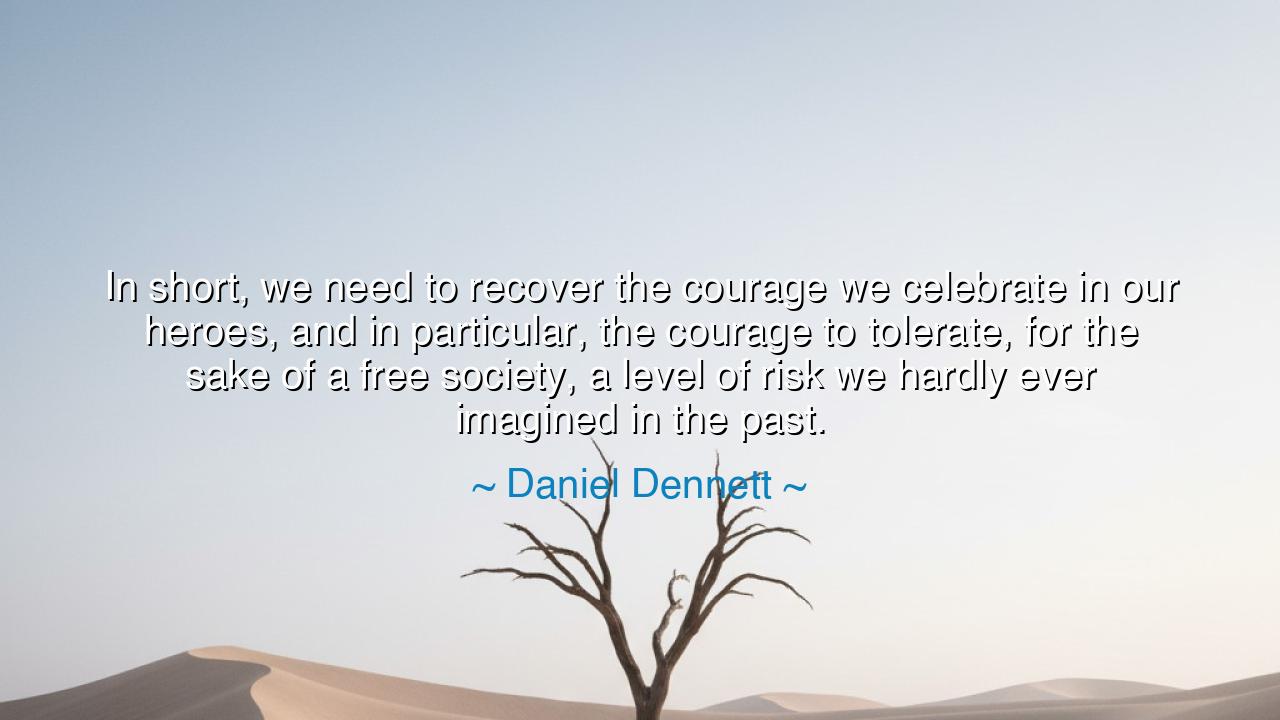
In short, we need to recover the courage we celebrate in our
In short, we need to recover the courage we celebrate in our heroes, and in particular, the courage to tolerate, for the sake of a free society, a level of risk we hardly ever imagined in the past.






“In short, we need to recover the courage we celebrate in our heroes, and in particular, the courage to tolerate, for the sake of a free society, a level of risk we hardly ever imagined in the past.” Thus spoke Daniel Dennett, the philosopher of reason and consciousness, whose words echo like a solemn bell calling humankind to remembrance of its own strength. His is not a call to recklessness, but to courage — that ancient virtue without which freedom withers. In this age of safety and control, where comfort is mistaken for peace and caution for wisdom, Dennett reminds us that liberty itself demands the daring heart. For no society can remain free if it is unwilling to bear the risks that freedom requires.
The meaning of his words is both timeless and urgent. He warns that the spirit of courage — once our guiding flame — has grown dim in a world obsessed with security. In seeking to eliminate all danger, humanity risks building not a sanctuary, but a prison. For when fear governs a people, they surrender choice for protection, truth for stability, and thought for convenience. Yet freedom, as the ancients knew, is a perilous gift. To live as a free soul is to walk daily through uncertainty, trusting not in the safety of walls, but in the strength of one’s character. Dennett calls us to reclaim that strength, to recover the inner heroism that built civilizations, crossed oceans, and defied tyranny.
The origin of this wisdom arises from Dennett’s reflections on modern society — a world where fear of error, harm, and offense threatens to silence the open exchange of ideas. His words stand as a defense of intellectual courage, the bravery to think freely even when thought invites risk. He understood that a truly free society is not one without danger, but one that faces danger with integrity. Freedom of speech, freedom of inquiry, freedom of conscience — these are not luxuries of comfort but triumphs of bravery. To preserve them, we must accept the risk of disagreement, of discomfort, even of being wrong.
Consider, as an example, the story of Socrates, who centuries ago stood before the judges of Athens accused of corrupting youth and questioning the gods. Offered the chance to live in silence, he chose instead to die for truth. His courage was not in the act of defiance alone, but in his calm acceptance of the risk that truth demands. Socrates’ death became a seed — from his sacrifice grew the very spirit of philosophy and democracy that would shape the future. He understood what Dennett reminds us now: that a people unwilling to endure risk will soon be unworthy of freedom.
So too in more recent times do we see this truth. When Rosa Parks refused to yield her seat on that fateful bus, she risked her safety, her livelihood, her peace. Yet her quiet courage became the spark that ignited the Civil Rights Movement. In her act we see Dennett’s vision — that the liberty of a society depends upon individuals willing to face danger for the sake of justice. The path of the free has never been paved in ease; it is built by those who accept the cost of standing upright when the world would prefer they kneel.
To tolerate risk, as Dennett implores, is not to abandon wisdom but to embrace life as it truly is — unpredictable, uncertain, alive. Fear, when left unchecked, breeds control, and control breeds tyranny. The antidote is not recklessness, but courage tempered with understanding. We must learn again to face danger not with despair but with dignity — to allow others to speak even when we disagree, to explore ideas that unsettle us, to step beyond comfort in pursuit of progress. Only by enduring such risks can a people grow wise, and only by growing wise can they remain free.
The lesson, then, is as clear as it is profound: a free society is not inherited — it is maintained by the daily courage of its citizens. Each generation must choose whether to live bravely or safely, whether to nurture liberty or smother it beneath the weight of fear. So, my child, do not shrink from the risks that life presents. Speak truth even when it trembles on your lips. Stand firm when silence is easier. For it is through the small acts of individual courage that the great edifice of freedom is upheld.
And remember this: the heroes we revere did not wait for safety before they acted — they acted despite danger. To recover their courage is to recover our humanity. Let us, then, be worthy of the age we live in — daring enough to face uncertainty, generous enough to allow freedom its peril, and wise enough to know that without risk, no liberty, no truth, and no greatness can ever endure.






AAdministratorAdministrator
Welcome, honored guests. Please leave a comment, we will respond soon